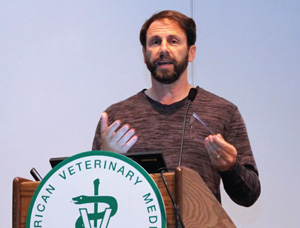Sessions explore issues in supply of veterinarians
The audience overflowed the room for a three-hour series of sessions July 28 at the AVMA Annual Convention about whether there is an oversupply of veterinarians—and what should be done if such an oversupply exists.
The panelists were Dr. Dennis McCurnin, Dr. James Wilson, Mark Cushing, Dr. Dennis Lawler, and Dr. Paul Pion. Dr. Alice Villalobos was the facilitator. Each panelist gave a presentation, and the question-and-answer period at the end ran overtime with impassioned discussion.
Among the presentations were Cushing’s talk on “Alleged oversupply of veterinarians” and Dr. Pion’s talk on “Ethical issues relating to the oversupply (‘excess capacity’) of veterinarians.”
Cushing, a lawyer with the Animal Policy Group, said the low unemployment rate of veterinarians means there is no oversupply.
“We don’t have a duty to scare undergraduates with bad news,” Cushing said. “There’s a lot bigger picture to share.”

He said the AVMA’s 2013 U.S. Veterinary Workforce Study found excess capacity in the veterinary industry, not an oversupply of veterinarians. He pointed out that many industries have the capacity to produce more than they are producing.
Many small animal practices are doing very well, Cushing said. He sees opportunities ahead with the growing U.S. population and in the high proportion of pets not currently receiving veterinary care.
Dr. Pion, co-founder of the Veterinary Information Network, said the problem is not only the quantity of employment but also the quality.
He summarized some of the questions that the panelists raised. Is the ratio of veterinarians’ educational debt to income sustainable? Does the veterinary community have a responsibility to maintain or increase the value of a veterinary degree? How have economic realities and the actions of groups led the profession to the current situation?
Dr. Pion said diversifying veterinarians’ roles would be good for the profession and for society, but he believes the need is limited because others can fill roles in areas such as global health.

He agreed that the profession should tell the whole story, good and bad, to aspiring veterinarians. The VIN Foundation has started a website to tell that story.
Dr. Pion said the profession should do more public relations to increase demand, but he believes veterinary care will remain a luxury for many pet owners.
He said the profession should not be afraid to talk about the supply side or to talk with veterinary colleges about the< perils of overexpansion. He said, “Just the fact that we can say we absorb all graduates does not mean we are OK.”
Michael Dicks, PhD, director of the AVMA Veterinary Economics Division, said after the convention that the discussion of the supply side is occurring in various venues and will continue during the Oct. 28 AVMA Economic Summit.